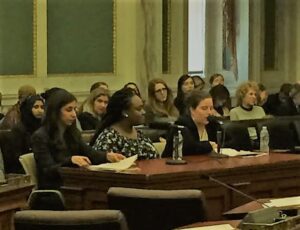A 2015 report by the Sheller Center was part of the advocacy that led to this week’s announcement, by the Pennsylvania Supreme Court, of a statewide “language access” plan for Pennsylvania courts.
The Center’s 2015 report, which focused on the state’s Magisterial District Justice courts, found that people with limited English proficiency (LEP) were sometimes expected to proceed without interpretation services, or with “help” from friends or family. The Center initiated its study after the ACLU filed two complaints with the Civil Rights Division of the U.S. Department of Justice, highlighting the lack of access to interpreters by two litigants in the Pennsylvania courts. In response to the efforts of a coalition of advocates for LEP individuals, the Administrative Office of Pennsylvania Courts finally developed a plan that represents a big step forward for Pennsylvania.
The biggest challenge ahead will be implementation and monitoring of the plan in the state’s 60 judicial districts. Sheller Center students are embarking on a follow-up project to the 2015 study to assess whether the language access needs of LEP individuals are, in fact, being met. “Our observations have shown the progress that courts have made towards providing language access services, but we have also identified many areas for growth,” said Lisa Burns, a 2L working on the project as part of the Center’s Social Justice Lawyering Clinic.
Click here for a WHYY report summarizing the Supreme Court announcement.

 ter, where I coordinate and escort clients to necessary medical appointments as a part of the Refugee Health Access team. Additionally, I work as a volunteer interpreter by appointment at HIAS, interpreting for Farsi-speaking clients. Often times, this work is exhausting, both mentally and emotionally.
ter, where I coordinate and escort clients to necessary medical appointments as a part of the Refugee Health Access team. Additionally, I work as a volunteer interpreter by appointment at HIAS, interpreting for Farsi-speaking clients. Often times, this work is exhausting, both mentally and emotionally.